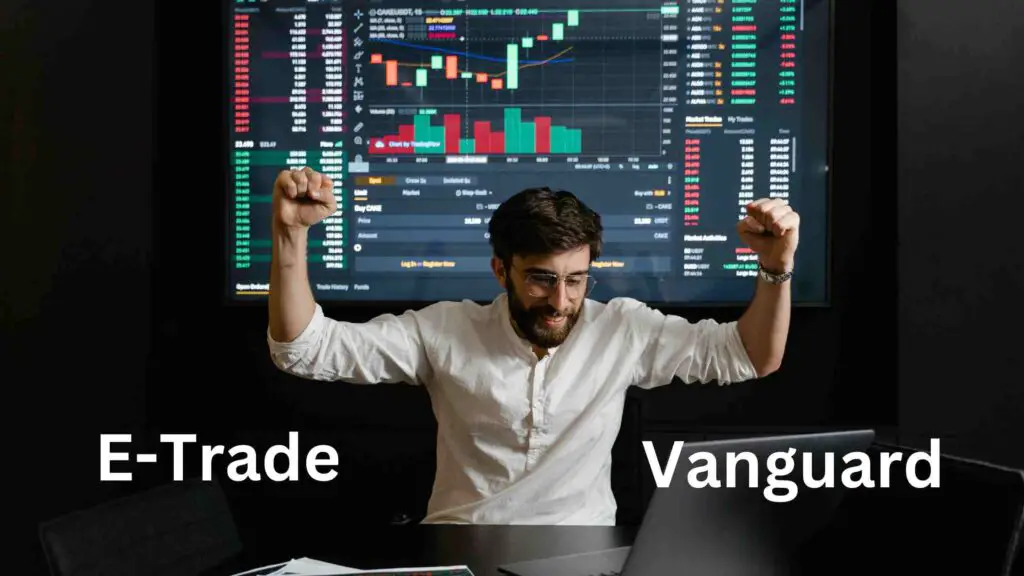In 2024, what would you pick between E Trade vs Vanguard? If you have clicked on this article, you must wonder about the disparity between E* TRADE and Vanguard. Right? Before we start, let us tell you something. Making choices between E*TRADE and Vanguard is like comparing day and night.
Both of the platforms offer amazing services, and both platforms are the best when it comes to investment media. Each of them caters to different audience segments. So, it is hard to say which one is better.
But this doesn’t mean we cannot determine which is best for platforms meeting your investment standards. This article will look at every minute detail that would help investors sort out their dilemma between E*TRADE and Vanguard.
Before we get started with our E*TRADE vs Vanguard article, let us first bifurcate what exactly these two investment platforms do and how and why they are popular among investors.
What is Etrade and Vanguard

Etrade
So, when it comes to ETRADE, it is a platform where investors can get their hands on many items like stocks, bonds, ETFs, and much more. With an easy-to-trade (user-friendly interface) and investment opportunities, Etrade has garnered a lot of audience.
Under the umbrella of Morgan Stanley. Etrade has succeeded in providing seamless services and an enjoyable trading environment for numerous aspiring investors. With about 4,000 mutual fund options with no transaction costs, Etrade has become a go-to platform for many capitalists.
Another reason many investors back Etrade is its zero per cent commission charges policy, especially for those investors who trade regularly. This no-commission fee is basically like a haven on earth for them.
On top of that, due to its features like real-time market info, the app has become a light in the tunnel for many investors. With E*TRADE, there’s no need to worry about jumping through hoops – no minimum account balance is required.
Vanguard
On the other hand, when we talk about Vanguard is a big player regarding investment opportunities. They top the charts with tailored investment opportunities, like their cool 401(k) plans, which are best for investors eagerly looking for retirement prospects. We can also call Vanguard a penny pincher’s paradise.
Vanguard also emphasizes low-cost investments, a sanctuary for those looking out for long-haul run plans. With the plethora of options, minimal costs, and top off with tailor-made investment opportunities instead of one-size-fits-all. Vanguard has succeeded in attracting those who are focused on the long-term horizon.
Vanguard is like a sturdy, budget-friendly car for building up your money over time, which is great for folks aiming to retire comfortably.
However, E*TRADE is more like a lively marketplace, perfect for active traders who enjoy lots of buying and selling.
Choosing between these two platforms comes down to what you like. What are your goals, and how do you prefer to invest your money? It’s like picking between a reliable ride or a bustling bazaar!
Which one generally has lower fees for trading stocks and ETFs? (E*TRADE or Vanguard)
So, ETRADE and Vanguard offer good deals and prices when we talk about stocks, funds, bonds, and ETFs. When we speak about ETRADE, the platform is well known for its zero-dollar commission fees for supplies and EFTs. While on the same side, with a wide array of options and 0$ fees, Vanguard has also made its name in people’s minds.
Though both platforms have pros and cons, it does not stop people from commenting on how ETRADE’s fees are more than Vanguard’s. Ultimately, we can only say that do not go with the flock of crowds; choose what suits you best.
Which platform offers a wider selection of commission-free ETFs, E*TRADE or Vanguard?
When serving crowds with a wide range of selections regarding zero-commission ETFs, Etrade is the clear winner in this match. In the commission-free category, Etrade offers about 4,400 options in mutual funds. And around 1,800 ETFs.
Vanguard offers commission-free ETFs only. Based on the report available, Etrade is far better than Vanguard when it comes to zero per cent commission,
Are there significant differences in the minimum investment requirements between E*TRADE and Vanguard?
Coming to other criteria to determine in Etrade V/S Vanguard, is there any minimum deposit that investors need to make before they can begin trading on both platforms? For ETRADE, no such criteria or minimum deposits need to be done. On the other side, Vanguard, though some investment options do not require a deposit, but eventually, around 3000 dollars is said to be the minimum deposit for Vanguard.
Therefore, investors who do not have huge capital can opt for ETRADE.
Regarding user interface and ease of use, which platform, E*TRADE or Vanguard, is more beginner-friendly?
Which investment platforms have the best user interface? When we compare both platforms, the clear winner in this match would be ETRADE. According to the various surveys and opinions by the investors, ETRADE’s interface is very easy-to-use and user-friendly.
ETRADE has many resources and tools for investors who trade regularly. Some resources provide great insights for the amateur trader, thus making this journey easy and seamless. While Vanguard offers great tools, the platform focuses on long-term planning and investment. Also, Vanguard lacks resources for in-depth explanations about risk and all.
Hence, if you have just started your journey in stocks and trading, ETRADE would make your path easier than Vanguard. But Vanguard would be your safer bet if you are looking for long-term investment possibilities.
Does E*TRADE or Vanguard provide more comprehensive research tools and educational resources for investors?
In this matter, ETRADE outshines Vanguard. Etrade provides a vast list of tools and educational videos that help many newbie investors start their trading journey, thus making ETRADE the top choice among dynamic investors.
Vanguard is good for those focusing on long-term investments and retirement plans.
Based on the above facts, it is crystal clear that ETRADE stands out with free tools, courses, and insights from big names like S&P Capital IQ and Morningstar.
E* TRADE is the go-to option for those wanting solid research and education.
Regarding the variety of investment options, such as mutual funds and fixed-income securities, which platform stands out – E*TRADE or Vanguard?
When we mention investment options in mutual funds and securities, ETRADE is the clear winner with many diversified options. As we already know, ETRADE offers extensive selections of options for their investment choices. Etrade provides around 4400 opportunities in zero per cent transaction and 1800 in ETFs (0 per cent commission).
In contrast, while Vanguard provides access to 16,000+ mutual funds. The platform concentrates on retirement and long-term investments and limits complex options trading.
In essence, ETRADE offers a more extensive range of investment choices. Thus making it the preferred option for those seeking variety.
Are there noticeable disparities in the customer service quality between E*TRADE and Vanguard?
ETRADE and Vanguard both offer good customer service. But there are reports of declining quality at Vanguard, with long wait times and less knowledgeable representatives.
Meanwhile, ETRADE has improved its customer support, providing 24/7 live chat and more free tools and courses.
In summary, while both have good service, ETRADE has a slight edge in customer support and educational resources.
Which platform, E*TRADE or Vanguard, tends to have lower expense ratios for their index funds?
According to the information on the internet, Vanguard has lower expense ratios than ETRADE. Vanguard is well known for its services, including affordable stocks and funds. According to the figures, Vanguard mutual funds cost about 83% less than the industry average. For instance, Vanguard’s Total Stock Market Index Admiral Shares fund has an expense ratio of just 0.04 Percent, which converts to a mere value of 40 dollars. While the annual cost for a $100,000 investment.
ETRADE, too, offers a vast array of investment options. This includes numerous no-transaction-fee mutual funds and commission-free ETFs. Vanguard’s lower expense ratios make it a preferred choice for those seeking budget-friendly index funds.
- Regarding account types offered, does E*TRADE or Vanguard provide investors with a more diverse range of options?
Both investment platforms have their peaks. Both sides offer a comprehensive list of investment options from which investors can choose. However, if we have to compare, Vanguard offers more diversified options than ETRADE. Vanguard options are less expensive than ETRADE.
For more information, check out both platforms and choose the platform that best fits your needs.
- Does E*TRADE or Vanguard have a more intuitive and feature-rich mobile app for trading on the go?
Based on the results we managed to get online, ETRADE is more intuitive and rich in features than Vanguard. Investors can check their balances, transaction history, price, exchange buy and sell on Etrade’s app. On the other hand, Vanguard concentrates more on activities such as managing portfolios, checking balances, basic trading options, etc.
Based on this information, going with ETRADE would be their best bet if investors are more into daily trading.
Which platform, E*TRADE or Vanguard, is more suitable for long-term investors aiming for retirement planning?
With low-cost index funds and ETFs, Vanguard is the go-to choice for long-term investors eyeing retirement planning. It is perfect for those looking to build and hold a diverse portfolio.
Vanguard sweetens the deal with retirement calculators for effective planning. Meanwhile, E*TRADE suits frequent traders and active investors hungry for market action. Their comprehensive trading tools and research reports cater to those wanting to trade frequently.
In short, Vanguard is for the retirement-minded. At the same time, E*TRADE is the pick for active traders seeking market opportunities.
Is there a notable distinction between E*TRADE and Vanguard regarding international investing options?
ETRADE gives more choices for international investing, including foreign stocks and ADRs. They offer access to foreign exchanges and various international mutual funds and ETFs.
Vanguard has fewer options, focusing mainly on international mutual funds and ETFs. ETRADE suits those wanting a broader global range, while Vanguard is better for a simpler approach to international investing.
Does E*TRADE or Vanguard offer better tools for analyzing and tracking investment performance?
ETRADE is better for tracking investments with robust tools and education. They provide free courses, research reports, and a robo-advisory service. Their platform has risk analysis, suitable for both active and passive investors.
Vanguard is more for long-term investors, with fewer tools and educational resources. Overall, ETRADE offers better tools for tracking investments, especially those wanting an active stock trading approach and thorough retirement planning.
- Are there differences in the margin rates charged by E*TRADE and Vanguard?
| Balance Range | E*TRADE Margin Rate | Vanguard Margin Rate |
| Under $10,000 | 11.95% | Not specified |
| $10,000-$249,999 | Not specified | Not specified |
| $250,000-$499,999 | 9.95% | Not specified |
| $500,000 and up | Need checking | Not specified |
Which platform, E*TRADE or Vanguard, has a more extensive network of physical branch locations for in-person support?
ETRADE has over 500 branches nationwide, offering in-person support with services like investment advice and portfolio reviews.
Vanguard’s branch network is smaller, and the exact number isn’t specified. In summary, ETRADE has a more extensive network of physical branches for in-person support than Vanguard.
Conclusion
In summary, the decision between E*TRADE and Vanguard depends on individual preferences and investment objectives.
E*TRADE stands out for its extensive international investment options, lower fees, and comprehensive tools, making it a preferred choice for active traders.
On the contrary, Vanguard caters to long-term investors, focusing on retirement planning and offering low-cost index funds.
E* TRADE has a slight edge in terms of customer service and a more extensive branch network. The final choice should align with specific needs and preferences.
We hope this article has helped you understand the differences between ETRADE and Vanguard. If you have any questions, feel free to reach out to us. We would be more than happy to help you out. Till then, bye, we will see you in another blog with some mind-boggling facts and information!! See you all soon!!
